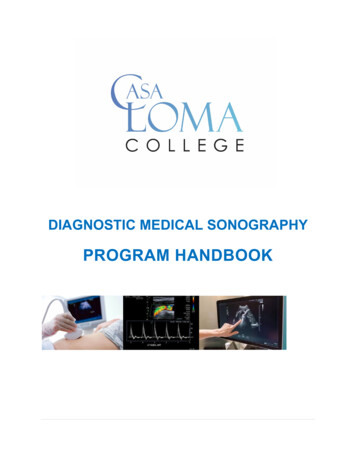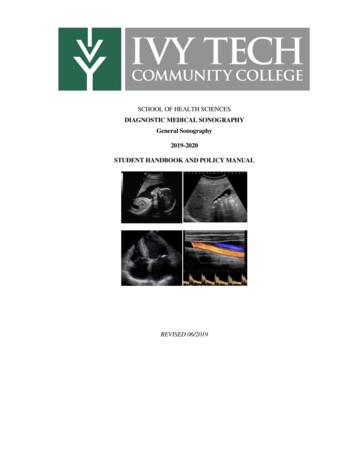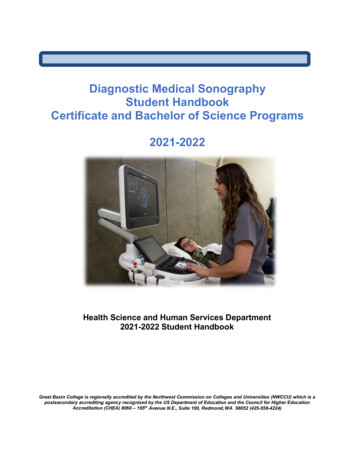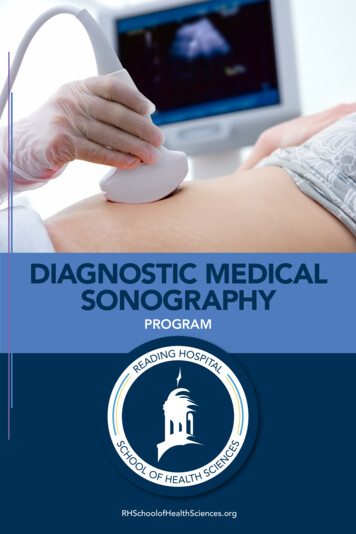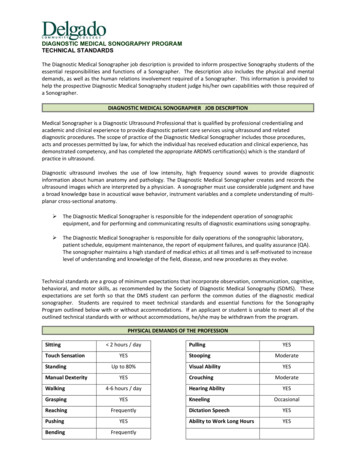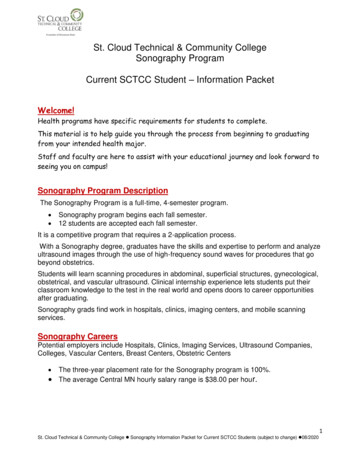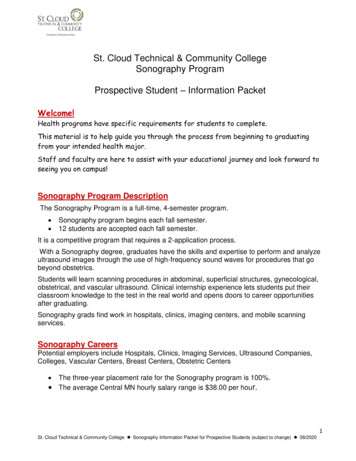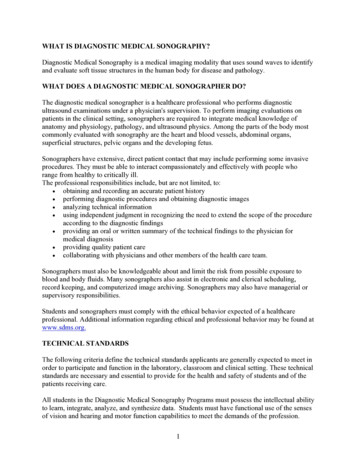
Transcription
WHAT IS DIAGNOSTIC MEDICAL SONOGRAPHY?Diagnostic Medical Sonography is a medical imaging modality that uses sound waves to identifyand evaluate soft tissue structures in the human body for disease and pathology.WHAT DOES A DIAGNOSTIC MEDICAL SONOGRAPHER DO?The diagnostic medical sonographer is a healthcare professional who performs diagnosticultrasound examinations under a physician's supervision. To perform imaging evaluations onpatients in the clinical setting, sonographers are required to integrate medical knowledge ofanatomy and physiology, pathology, and ultrasound physics. Among the parts of the body mostcommonly evaluated with sonography are the heart and blood vessels, abdominal organs,superficial structures, pelvic organs and the developing fetus.Sonographers have extensive, direct patient contact that may include performing some invasiveprocedures. They must be able to interact compassionately and effectively with people whorange from healthy to critically ill.The professional responsibilities include, but are not limited, to: obtaining and recording an accurate patient history performing diagnostic procedures and obtaining diagnostic images analyzing technical information using independent judgment in recognizing the need to extend the scope of the procedureaccording to the diagnostic findings providing an oral or written summary of the technical findings to the physician formedical diagnosis providing quality patient care collaborating with physicians and other members of the health care team.Sonographers must also be knowledgeable about and limit the risk from possible exposure toblood and body fluids. Many sonographers also assist in electronic and clerical scheduling,record keeping, and computerized image archiving. Sonographers may also have managerial orsupervisory responsibilities.Students and sonographers must comply with the ethical behavior expected of a healthcareprofessional. Additional information regarding ethical and professional behavior may be found atwww.sdms.org.TECHNICAL STANDARDSThe following criteria define the technical standards applicants are generally expected to meet inorder to participate and function in the laboratory, classroom and clinical setting. These technicalstandards are necessary and essential to provide for the health and safety of students and of thepatients receiving care.All students in the Diagnostic Medical Sonography Programs must possess the intellectual abilityto learn, integrate, analyze, and synthesize data. Students must have functional use of the sensesof vision and hearing and motor function capabilities to meet the demands of the profession.1
Students must:1. Observe patients, manipulate equipment, and evaluate image quality.A. Observe changes in patient conditionB. Utilizing equipment for maximum diagnostic resultsC. Differentiate primary colors, shades of gray, and real-time images, as well as,delineate spatial relationships, borders, and pathological entities in threedimensional planes2. Demonstrate sufficient hearing to access patient needs and communicate verbally withother health care providers.A. Acquire informationB. Perceive nonverbal communicationC. Differentiate Doppler signalsD. Hear audible alarms3. Demonstrate sufficient verbal and written skills to communicate needs promptly andefficiently in English.A. Must verbally instruct patientsB. Speak in a way that is clearly understood by the average person at close rangeC. Foster mature, sensitive, and effective relationships with patients and other healthcare professionalsD. Demonstrate patient confidentiality4. Demonstrate sufficient gross and fine motor coordination to respond promptly and ensurepatient safety.A. Safely perform imaging proceduresB. Assess and comprehend the condition of the patientC. Ability to lift 50 pounds5. Demonstrate satisfactory intellectual and emotional functions to exercise independentjudgment and discretion in the safe technical performance of sonographic imagingprocedures.A. Function effectively under stressB. Adapt to changing environments and exhibit independent judgment and criticalthinkingC. Demonstrate compassion, empathy, integrity, concern for others, interest, andmotivationCAREER OPPORTUNITIES FOR SONOGRAPHERSSonography is a dynamic profession that has grown significantly over the past 20 years. The U.S.Bureau of Labor states that employment of diagnostic medical sonographers is expected to growby 39 percent from 2012 to 2022, which is much faster than the average for all occupations.With rapidly developing new technologies and increased use of diagnostic ultrasoundprocedures, growth is projected to continue in the future with employment opportunities forqualified sonographers in both urban and rural areas nationwide. Graduates of our sonographyprograms can choose to work in clinics, hospitals, private practice physician offices, publichealth facilities, laboratories and other medical settings performing examinations in their areas ofspecialization. Career advancement opportunities exist in higher education, administration,research and with commercial companies in roles such as educators, application specialists or2
sales representatives.SALARIES FOR SONOGRAPHERSIn addition to excellent career opportunities, salaries for sonographers are competitive with, orhigher than other professionals with similar levels of education. According to the 2013 SDMSSalary and Benefit Survey Report, the median salary for sonographers is 78,520 annually.WHY CHOOSE THE UNIVERSITY OF FINDLAY DIAGNOSTIC MEDICALSONOGRAPHY PROGRAMS?The mission of The University of Findlay is to equip our students for meaningful lives andproductive careers. The Diagnostic Medical Sonography Programs are committed to provide anintellectually stimulating and challenging environment where competency based education insonography is focused on the needs of the patient and intended to produce competentprofessionals of the highest caliber. The programs modeled the institutions mission whendeveloping program goals and the curriculum. Program goals, educational structure, outcomesassessment and course objectives are in alignment with both the institutions and programsmission statements.Sonography faculty have extensive backgrounds in higher education, teaching and advising, andworking with a diverse student population to achieve their goals. The faculty are passionateabout students, ensuring their success and cultivating their potential. Additionally, the uniqueacademic and clinical component of the programs, offers the students a fast track to their careers.PROGRAM ACCREDITATIONThe University of Findlay Diagnostic Medical Sonography Programs are accredited by theCommission on Accreditation of Allied Health Education Programs (www.caahep.org) uponrecommendation of the Joint Review Committee on Education in Diagnostic MedicalSonography (JRC-DMS).Commission on Accreditation of Allied Health Education Programs25400 US Highway 19 North, Suite 158Clearwater, FL 33763727-210-2350www.caahep.orgADVISORY COMMITTEEThe advisory committee for the sonography programs consists of representatives from programclinical education centers, the sonography community at-large, a medical director, a publicmember, and a student representative. The committee is charged with the responsibility ofassisting the programs in formulating and revising appropriate goals and learning domains,monitoring needs and expectations and ensuring program responsiveness to change. Refer to theprogram website for an updated list of Advisory Committee Members.3
LOCATION/FACILITIESThe Diagnostic Medical Sonography programs are located in the Diagnostic Services Buildinglocated at 401 Trenton Avenue. The Diagnostic Medical Sonography Programs have dedicatedclassrooms and labs which house state-of-the-art equipment and instructional aides.University facilities that are available to all university students which may be of interest toSonography students include: The Ralph and Gladys Koehler Fitness and Recreation Complex(indoor track, basketball, volleyball, tennis courts, Student Recreation Center), Croy PhysicalEducation Center (gymnasium, swimming pool, and basketball court), the Gardner FitnessCenter (exercise and weight rooms), Shafer Library, Alumni Memorial Union, Bucher Center(enrollment services, counseling services), and the Cosiano Health Center.PROGRAM OVERVEWThe University of Findlay offers a Bachelor of Science Degree and an Associate of Arts Degreewith a major in General Sonography, Vascular Sonography or Echocardiography. A Certificateof Completion is offered to credentialed health professionals who opt to enhance their skillsetsand careers.The Diagnostic Medical Sonography programs at The University of Findlay offer a unique andinnovative approach to sonography education. Students will spend approximately 40 hours perweek on campus in the classroom and laboratory setting for one semester. Upon completion ofthe academic portion of the program, students will spend 35 weeks in a clinical education centerat 40 hours per week to equal 1,400 hours. In the clinical setting students will apply knowledgeacquired on campus in direct patient care settings.CREDIT FOR PREVIOUS DIAGNOSTIC MEDICAL SONOGRAPHY EDUCATIONPrevious educational sonography experiences are not considered to fulfill the requirements of thecourses within the Diagnostic Medical Sonography Programs.PROGRAM PREREQUISITES/REQUIREMENTSDiagnostic Sonography Program applicants must complete all following prerequisite courseswith a “C” or better to gain acceptance into any program:o Anatomy and Physiology Io Anatomy and Physiology IIo General Physics with Lab or highero College Algebra or highero Communication Course:EnglishCompositionSpeechArgumentation and Debate4
CLINICAL EDUCATION CENTERSThe Diagnostic Medical Sonography Programs are associated with a number of approved clinicaleducation centers throughout the United States and may be available in your hometown. Clinicaleducation will be completed under the supervision of credentialed sonographers. Students maynot solicit facilities to become Clinical Education Centers.STUDENT OBSERVATION HOURSStudents are required to spend a minimum of four hours observing in a department which offersthe specialty of his/her choice. Students interested in more than one program should observe ineach area for four hours. This observation time may be completed at any health care facility.Observation hours must be documented on the Student Observation Form available from theDiagnostic Medical Sonography Program Office. Upon completion of the observation/s, thestudents are required to return the signed form to the Diagnostic Medical Sonography ProgramOffice.ADMISSION INFORMATIONProspective applicants are encouraged to apply at least 9-12 months prior to the desiredbeginning class date since enrollment in the program is limited and clinical placement iscompetitive. Students may only request acceptance into one program and applicants who fail toreturn the acceptance card to the Diagnostic Medical Sonography Program Office by thedeadline date, will be removed from the admissions list.Applications are accepted throughout the calendar year with designated deadlines. Please notethat applications received after the deadline will be reviewed at the discretion of the AdmissionsCommittee, and will only be considered if time and space permits.Admission into a sonography program is limited due to the availability of clinical educationcenters. Students will be evaluated and ranked based upon their overall grade point average,number of remaining courses toward degree completion, being a current UF student, and date ofapplication for the sonography program.In the event that a student is not selected for admission into a sonography program, the studentmust notify the Diagnostic Sonography Program Office if they would like to be reevaluated forthe next program start date or if they would like their file closed. Students who do not respondwill have their file closed, and must repeat the application process for any future programadmission.A student under academic/disciplinary suspension or dismissal from another college/universityor an accredited diagnostic medical sonography program will not be considered for enrollmentuntil eligible to return to his/her former program.5
ADMISSION PROCESSSTEP 1 Complete the undergraduate application for admission to The University of Findlay. Contact theOffice of Admissions at admissions@findlay.edu or 419-434-4732 with any questions.Students must apply to The University of Findlay via the University’s webpage or in person atthe Admissions duate/Apply-NowSTEP 2 Complete the Diagnostic Medical Sonography (DMS) application. Once formal acceptance to theuniversity has been completed, students are required to complete an application to the DiagnosticMedical Sonography Programs which is available in the Diagnostic Medical Sonography Officeor on the program website. A non-refundable 50.00 application fee must accompany theDiagnostic Medical Sonography application form. Applications received without the applicationfee are not processed. Contact the Diagnostic Medical Sonography Programs Office atdms@findlay.edu or 419-434-5886 with any /sonography/Admission-Information Mail the application and the 50.00 DMS application fee to:The University of FindlayDiagnostic Medical Sonography Programs1000 North Main StreetFindlay, OH 45840419-434-5886When a student has a completed file and it is submitted by the deadline dates, the application willbe reviewed for admission. A completed file includes: UF acceptance Completion of the program application and fee A minimum cumulative GPA of 2.5 Submission of most recent transcripts Documentation of observation hours Completion of program prerequisites with a “C” or higherSTUDENT SELECTION PROCESSThe number of students accepted is limited by the number of available clinical education centers.In the event that there is a greater number of applicants than available centers the followingcriteria will be used to rank students for acceptance:6
Cumulative GPA will be multiplied times 15, for a maximum of 60 pointsPoints for any remaining courses required for degree completion will be awarded asfollows:o The maximum 40 points will be given to students that have all required degreecourses with the exception of the sonography program courses completedo 35 points will be given for students having 1-2 courses remainingo 28 points will be given for students having 3-6 courses remainingo 15 points will be given for students having 7-10 courses remainingo No points will be given for students having 11 or more courses remainingTwo points will be given to current UF studentsIn the event that students earn the same number of points, selection will be determined bythe earliest date of program applicationThe Admissions Committee will notify students of their conditional acceptance into the programwithin two weeks after the deadline date. Students will be given two weeks to notify theDiagnostic Sonography Program Office of their acceptance into the program. Students will thenreceive information of the Clinical Education Center Interview Process.CLINICAL EDUCATION CENTER INTERVIEW PROCESSAll students must interview and be accepted at a Clinical Education Center before officialprogram acceptance. Students will receive a list of available centers in which to indicate theorder of preference they would like for clinical education center interviews. The form must bereturned by the deadline. The dates of returned preference forms may be used to determinewhich students interview at their top choices, if students select the same centers.The program cannot guarantee that students will be placed at their first, second or thirdchoice. Clinical education center placement is dependent upon clinical center availabilityand input from the clinical education center.Students are not permitted to contact the centers for any reason until instructed to do so by theClinical Coordinator. All students must have secured a Clinical Education Center by thedeadline date.The program will notify the student as soon as possible of his/her confirmation by thefacility for clinical education once all students have completed the interview process andthe program receives follow up information from the centers. The clinical education centerreserves the right to accept or decline a student for clinical education.The student must submit to the clinical education center all required documents related toeach center’s specific requirements. Supporting documentation may include all officialtranscripts, health forms and background check information.OTHER PROGRAM REQUIREMENTSAfter securing a clinical education center, students will be provided a list of other programrequirements to complete. All students are required to complete a physical examination, becurrent with specific immunizations including the Influenza vaccination, be CPR certified,7
undergo a background check and drug screen, and submit proper documentation. All costs arethe student’s responsibility.Fall Start DeadlinesFor Echocardiography and General Sonography ProgramsJanuary 15thJanuary 30thCompleted file dueAdmission Committee will review studentfilesAcceptance Letters sent to studentsSeat acceptance verification dueStudents receive clinical interview processinformationStudents must have clinical education centersecuredFebruary 15thMarch 1stMarch 15thApril 15thJune 1stJune 15thSpring Start DeadlinesFor Vascular Sonography ProgramCompleted file dueAdmission Committee will review studentfilesAcceptance Letters sent to studentsSeat acceptance verification dueStudents receive clinical interview processinformationStudents must have clinical education centersecuredJuly 1stJuly 15thAug 1stSeptember 1stCURRICULUM:Diagnostic Medical Sonography students are highly encouraged to complete all degreerequirements prior to the start of the program. The Diagnostic Medical Sonography Programsconsists of the following academic courses:All students enrolled in General Sonography will complete the following courses:DMSA 400 Introduction to Sonography - This course focuses on defining the scope of practiceof the sonographer in the clinical setting and the basic skills required for patient care. Topics willinclude communication skills, basic vital signs, medical emergencies, invasive procedures andisolation techniques, history of sonography, career options and professional societies.Additionally, students will learn basic imaging characteristics, proper ergonomics andfundamental scanning skills.DMSA 405 Cross-Sectional Anatomy for Sonographers - Provides information on crosssectional anatomy in the human body with an emphasis on the organs of sonographic interest.Different scanning planes are represented including longitudinal, transverse, coronal and oblique8
views to include correlation with other imaging modalities.DMSA 410 Language of Sonography - This course is the study of the terminology usedroutinely in the medical environment and specifically in the field of Diagnostic MedicalSonography. The information will be presented according to anatomical systems. This course isdesignated for students who are accepted into one of the Diagnostic Medical Sonographyprograms or for those who are pre-Diagnostic Medical Sonography students.DMSA 415 Physics and Instrumentation- Discusses the fundamental principles of ultrasoundphysics along with the design and operation of the ultrasound equipment. Topics include wavecharacteristics, artifacts, propagation, acoustic variables, the Doppler effect, color flow mapping,hemodynamics, biological effects and review of mathematical skills. Students will be expectedto sit for the American Registry of Diagnostic Medical Sonographers (ARDMS) SonographyPrinciples and Instrumentation (Physics) Examination prior to graduation.DMSA 420 Pathophysiology for Sonographers- Explores the pathogenesis of diseaseprocesses and their impact on the human body. Correlation of pertinent patient history,laboratory data and imaging information will be emphasized to increase the necessary analyticalskills of differential diagnosis. Emphasis is placed on selected diseases encountered by thesonographer.DMSA 425 Capstone- This course will introduce the student to basic interview skills,professional portfolio and resume development. Emphasis will be placed the Society ofDiagnostic Medical Sonographers (SDMS) scope of practice and career options.DMSG 400 General Sonography I- Discusses the normal anatomy and physiology related tothe major abdominal organs, major abdominal vessels and superficial structures in the adult andpediatric patient. Topics include sonographic appearance, clinical assessment, evaluationprotocols, technical factors and image quality.DMSG 405 General Sonography II- Discusses the normal anatomy and physiology related tothe non-gravid female and pediatric pelvis and normal obstetrics. Topics include sonographicappearance, clinical assessment, evaluation protocols, technical factors and image quality.DMSG 410 General Sonography III- Discusses pathology of the major abdominal organs andmajor abdominal vessels and superficial structures in the adult and pediatric patient. Topicsinclude sonographic appearance, clinical assessment, evaluation protocols, technical factors andimage quality.DMSG 415 General Sonography IV - Discusses the pathology related to the non-gravid femaleand pediatric pelvis as well as obstetrical exams. Topics include sonographic appearance,clinical assessment, evaluation protocols, technical factors and image quality.DMSG 420 Clinical Education I- This course will provide basic instruction and scanningexperience in sonography in a hospital or other healthcare setting. The student will be able todemonstrate the ability to perform basic sonographic examinations according to the protocolsestablished by the program and healthcare facility utilizing sonographic equipment.9
DMSG 425 Clinical Education II - This course will provide basic instruction and scanningexperience in sonography in a hospital or other healthcare setting. The student will be able todemonstrate the ability to perform basic sonographic examinations according to the protocolsestablished by the program and healthcare facility utilizing sonographic equipment at the level ofan entry level sonographer.All students enrolled in Vascular Sonography must complete the following courses:DMSA 400 Introduction to Sonography - This course focuses on defining the scope of practiceof the sonographer in the clinical setting and the basic skills required for patient care. Topics willinclude communication skills, basic vital signs, medical emergencies, invasive procedures andisolation techniques, history of sonography, career options and professional societies.Additionally, students will learn basic imaging characteristics, proper ergonomics andfundamental scanning skills.DMSA 405 Cross-Sectional Anatomy for Sonographers - Provides information on crosssectional anatomy in the human body with an emphasis on the organs of sonographic interest.Different scanning planes are represented including longitudinal, transverse, coronal and obliqueviews to include correlation with other imaging modalities.DMSA 410 Language of Sonography - This course is the study of the terminology usedroutinely in the medical environment and specifically in the field of Diagnostic MedicalSonography. The information will be presented according to anatomical systems. This course isdesignated for students who are accepted into one of the Diagnostic Medical Sonographyprograms or for those who are pre-Diagnostic Medical Sonography students.DMSA 415 Physics and Instrumentation- Discusses the fundamental principles of ultrasoundphysics along with the design and operation of the ultrasound equipment. Topics include wavecharacteristics, artifacts, propagation, acoustic variables, the Doppler effect, color flow mapping,hemodynamics, biological effects and review of mathematical skills. Students will be expectedto sit for the American Registry of Diagnostic Medical Sonographers (ARDMS) SonographyPrinciples and Instrumentation (Physics) Examination prior to graduation.DMSA 420 Pathophysiology for Sonographers- Explores the pathogenesis of diseaseprocesses and their impact on the human body. Correlation of pertinent patient history,laboratory data and imaging information will be emphasized to increase the necessary analyticalskills of differential diagnosis. Emphasis is placed on selected diseases encountered by thesonographer.DMSA 425 Capstone- This course will introduce the student to basic interview skills,professional portfolio and resume development. Emphasis will be placed the Society ofDiagnostic Medical Sonographers (SDMS) scope of practice and career options.DMSV 400 Vascular Sonography I- Discusses the normal anatomy, physiology andhemodynamics of arterial and venous systems. Introduce students to the arterial and venousanatomy of the upper and lower extremities. Topics include sonographic appearance, clinicalassessment, evaluation protocols, technical factors and image quality.10
DMSV 405 Vascular Sonography II - Duplex ultrasound procedures used to assess normal andabnormal vasculature in the abdomen of the adult and pediatric patient are presented in thiscourse. Topics include sonographic appearance, clinical assessment, evaluation protocols,technical factors and image quality.DMSV 410 Vascular Sonography III- The theories, techniques and processes for non-imagingphysiological testing are presented. Experiential learning will be emphasized.DMSV 415 Vascular Sonography IV- The theories, techniques and processes of performingtranscranial Doppler and advanced vascular examinations will be presented. Topics include theevaluation of grafts, arteriovenous fistulas, pseudoaneurysms, and intraoperative procedures.Topics include sonographic appearance, clinical assessment, evaluation protocols, technicalfactors and image quality.DMSV 420 Vascular Sonography V- Normal and abnormal vascularity of the male and femalepelvis will be presented.DMSV 425 Clinical Education I- This course will provide basic instruction and scanningexperience in sonography in a hospital or other healthcare setting. The student will be able todemonstrate the ability to perform basic sonographic examinations according to the protocolsestablished by the program and healthcare facility utilizing sonographic equipment.DMSV 430 Clinical Education II- This course will provide basic instruction and scanningexperience in sonography in a hospital or other healthcare setting. The student will be able todemonstrate the ability to perform basic sonographic examinations according to the protocolsestablished by the program and healthcare facility utilizing sonographic equipment at the level ofan entry level sonographer.All students enrolled in Echocardiography must complete the following courses:DMSA 400 Introduction to Sonography - This course focuses on defining the scope of practiceof the sonographer in the clinical setting and the basic skills required for patient care. Topics willinclude communication skills, basic vital signs, medical emergencies, invasive procedures andisolation techniques, history of sonography, career options and professional societies.Additionally, students will learn basic imaging characteristics, proper ergonomics andfundamental scanning skills.DMSA 405 Cross-Sectional Anatomy for Sonographers - Provides information on crosssectional anatomy in the human body with an emphasis on the organs of sonographic interest.Different scanning planes are represented including longitudinal, transverse, coronal and obliqueviews to include correlation with other imaging modalities.DMSA 410 Language of Sonography - This course is the study of the terminology usedroutinely in the medical environment and specifically in the field of Diagnostic MedicalSonography. The information will be presented according to anatomical systems. This course isdesignated for students who are accepted into one of the Diagnostic Medical Sonographyprograms or for those who are pre-Diagnostic Medical Sonography students.11
DMSA 415 Physics and Instrumentation- Discusses the fundamental principles of ultrasoundphysics along with the design and operation of the ultrasound equipment. Topics include wavecharacteristics, artifacts, propagation, acoustic variables, the Doppler effect, color flow mapping,hemodynamics, biological effects and review of mathematical skills. Students will be expectedto sit for the American Registry of Diagnostic Medical Sonographers (ARDMS) SonographyPrinciples and Instrumentation (Physics) Examination prior to graduation.DMSA 420 Pathophysiology for Sonographers- Explores the pathogenesis of diseaseprocesses and their impact on the human body. Correlation of pertinent patient history,laboratory data and imaging information will be emphasized to increase the necessary analyticalskills of differential diagnosis. Emphasis is placed on selected diseases encountered by thesonographer.DMSA 425 Capstone- This course will introduce the student to basic interview skills,professional portfolio and resume development. Emphasis will be placed the Society ofDiagnostic Medical Sonographers (SDMS) scope of practice and career options.DMSE 400 Echocardiography I- This course provides a foundation in the principles ofechocardiography and gray scale duplex imaging of arterial and venous sonography. This courseinvolves understanding and recognition of normal cardiovascular anatomy, the electrophysiologyof the heart, the conduction system and mechanical events of the cardiac cycle. This coursediscusses mechanical and electrical events in cardiovascular hemodynami
university has been completed, students are required to complete an application to the Diagnostic Medical Sonography Programs which is available in the Diagnostic Medical Sonography Office or on the program website. A non-refundable 50.00 application fee must accompany the Diagnostic Medical Sonography application form.
